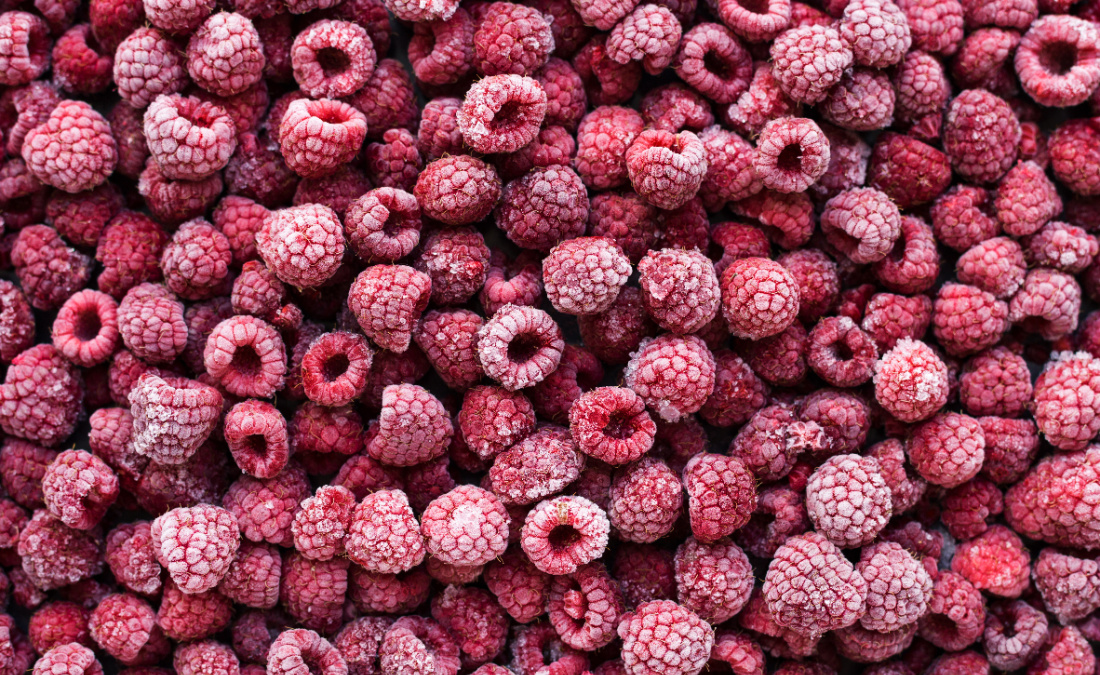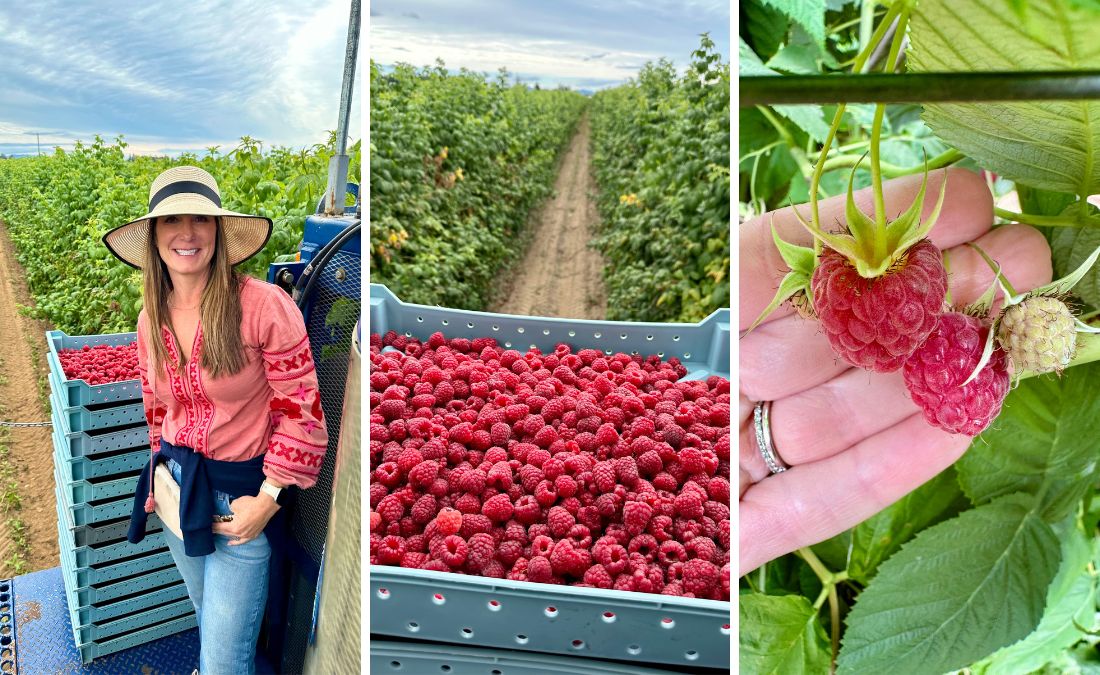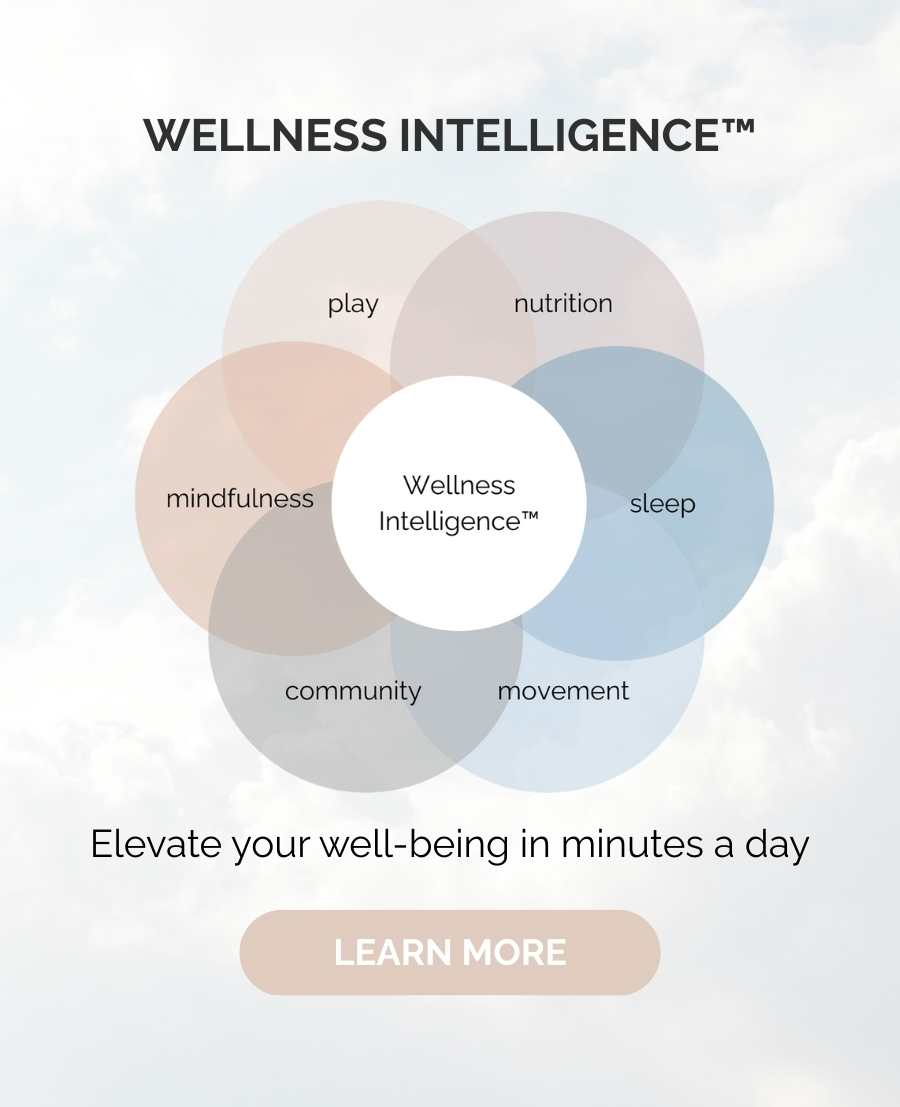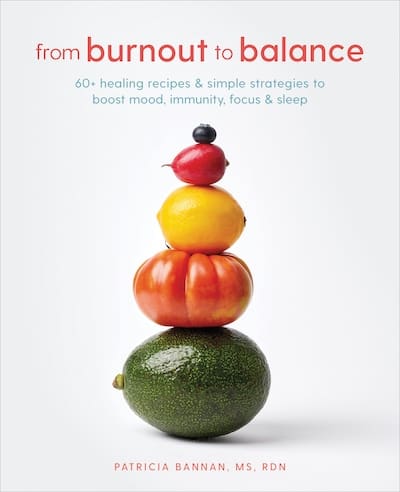As a registered dietitian, I often get asked: Are fresh foods always better than frozen? Recently, I had the chance to explore this question firsthand on a farm tour in Washington State, where I saw exactly how raspberries are frozen right after harvest.
The tour, sponsored by the American Frozen Food Institute, took us to Lynden, Washington. This area produces about 90% of the nation’s frozen raspberries! It was incredible to see fields of bright red berries stretching across the landscape, ready for harvest. Here’s what I discovered about frozen raspberries—and how they stack up against fresh.
I’m delighted to have partnered with the American Frozen Food Institute (AFFI) on this blog post. All opinions are my own.

See The Raspberry Harvester in Action
Watching the freezing process up close showed me why frozen berries can be just as good—if not better—than fresh. Freezing is key to preserving their taste, texture, and nutrients.
One of the coolest parts? I got to ride on a raspberry harvester! This machine shakes the raspberries gently off the bushes, and within 24 hours, they’re frozen to lock in all that amazing flavor and nutrition.
This experience gave me a new perspective on the power of frozen foods, especially frozen raspberries. Let’s dive into what I learned!
View this post on Instagram
Frozen vs. Fresh Raspberries: Nutrient Value
You might be surprised to learn that frozen raspberries are just as nutritious as fresh—and in some cases, even more so. Because frozen raspberries are flash-frozen at peak ripeness, they often retain more vitamins, minerals, and antioxidants than fresh berries, which can lose nutrients during transport and storage.
Research shows that frozen fruits like blueberries and raspberries can sometimes outperform fresh in nutritional value after just a few days. So, if you’re wondering, is frozen fruit healthy? the answer is absolutely yes!
Additional Benefits of Freezing Food
And it’s not just fruit—freezing helps protect key nutrients across a wide range of foods, from vegetables to seafood, meats, and grains. This process preserves essential antioxidants, vitamin C and B vitamins in fruits and vegetables, as well as fat-soluble vitamins like A and D in foods like seafood and meats. Freezing also maintains the texture and flavor of foods.
Think of freezing as nature’s way of hitting the “pause” button on nutrient loss. Let’s take a closer look at what this process involves and the benefits of frozen raspberries.
What Happens Before Raspberries Are Frozen?

By freezing raspberries this way, producers ensure that each berry maintains its quality, ready to be enjoyed just as if it were freshly picked.
The Benefits of the Freezing Process
The freezing process acts like a “pause button,” stopping the natural breakdown of nutrients and preserving the texture, color, and taste of fruit. This technology isn’t just used for raspberries—it’s common across all kinds of frozen produce and is a big reason why frozen fruits can sometimes be even more nutritious than fresh ones that sit in your fridge or on store shelves for days. Here are four major benefits of choosing frozen raspberries.

Benefit 1: Storage and Shelf Life
One of the biggest perks of frozen raspberries (and frozen food in general) is their long shelf life. While fresh raspberries spoil within a few days, frozen ones can last up to 12 months when stored properly.
If you’re wondering, can you freeze raspberries? Absolutely! Just make sure they’re kept at 0°F or lower to avoid freezer burn. For the best results, try vacuum-sealing or storing them in airtight containers. While freezer burn can affect flavor and texture, the food is still safe to eat—simply trim away the affected parts before using.
Benefit 2: Cost-Effectiveness
Frozen raspberries are typically more budget-friendly than fresh, especially when raspberries are out of season. Plus, since they can be stored for months, they help reduce food waste—one of the biggest contributors to household food costs.
Did you know that cutting food waste could save the average American household around $1,500 per year? Frozen raspberries, like most frozen fruits and vegetables, help you reduce waste since you can use only what you need and store the rest. Other frozen foods—like spinach, green beans, and even seafood—are also great options for keeping meals affordable and nutritious year-round.
Benefit 3: Sustainability and Reduced Food Waste
Sustainability is a hot topic, and frozen foods offer a practical solution. Freezing reduces food waste at every stage of the food chain—from farm to supermarket to home. Raspberries that aren’t pretty enough for fresh packaging often get repurposed for juices or purees, ensuring minimal waste.
On the consumer end, frozen foods allow you to use only what you need, minimizing spoilage and keeping your freezer stocked with nutritious options. The energy-efficient freezing process preserves food quality without relying on preservatives or additives, making it a natural way to keep food fresh longer.
Benefit 4: Convenience and Availability
One of the main reasons I love frozen raspberries (and all frozen foods, really) is their convenience. Frozen raspberries come pre-washed and ready to use—just grab what you need and add them to whatever you’re making!
How to Enjoy Frozen Raspberries

We enjoyed a signature raspberry spritz, raspberry-chipotle salmon sandwiches, and even a raspberry key lime pie—proving that frozen raspberries can elevate any dish, whether sweet or savory.

For simple, everyday uses, here are some of my favorite ways to enjoy frozen raspberries:
- Smoothies – Frozen raspberries are perfect for smoothies! They add a delicious tartness and eliminate the need for extra ice.
- Overnight oats – Toss a handful into your oats before refrigerating. They’ll thaw overnight, adding juicy sweetness to your breakfast.
- Raspberry sauce – Simmer with a bit of water and honey for a quick, flavorful dessert topping.
- Baking – Frozen raspberries hold up beautifully in muffins, cakes, and cobblers, adding a burst of tart flavor.
- Snacks – Sometimes, I even enjoy them straight from the bag for a cool, refreshing treat!
Frozen foods, like raspberries, make it easier to stick to healthy eating, even when life gets hectic. Just reach into your freezer, grab what you need, and you’re set!
Recipe Ideas with Frozen Fruits and Vegetables
Bottom Line
So, are frozen raspberries as good as fresh raspberries? In many ways, yes! They’re packed with nutrients, cost-effective, and convenient. And these benefits extend to frozen foods in general.
Freezing locks in nutrients, flavor, and texture at peak freshness, giving you quality produce year-round. Plus, frozen foods help reduce food waste and stretch your budget since you only use what you need and save the rest for later.
Whether it’s raspberries, vegetables, or proteins, frozen foods are a simple, natural way to maintain a nutritious, balanced diet without sacrificing convenience. So, next time you shop, don’t forget to check out the frozen food aisle—it’s a smart choice for your health and the environment!
References
- Linshan Li, Ronald B. Pegg, Ronald R. Eitenmiller, Ji-Yeon Chun, Adrian L. Kerrihard, Selected nutrient analyses of fresh, fresh-stored, and frozen fruits and vegetables, Journal of Food Composition and Analysis, Volume 59, 2017. ISSN 0889-1575, https://doi.org/10.1016/j.
- Neri L, Faieta M, Di Mattia C, Sacchetti G, Mastrocola D, Pittia P. Antioxidant Activity in Frozen Plant Foods: Effect of Cryoprotectants, Freezing Process and Frozen Storage. Foods. 2020;9(12):1886. Published 2020 Dec 17. doi:10.3390/foods9121886
- Rickman, J. C., Barrett, D. M., & Bruhn, C. M. (2007). Nutritional comparison of fresh, frozen and canned fruits and vegetables. Part 1. Vitamins C and B and phenolic compounds. Journal of the Science of Food and Agriculture, 87(6), 930-944. https://doi.org/10.1002/jsfa.2825
- Rickman, J. C., Bruhn, C. M., & Barrett, D. M. (2007). Nutritional comparison of fresh, frozen, and canned fruits and vegetables II. Vitamin A and carotenoids, vitamin E, minerals and fiber. Journal of the Science of Food and Agriculture, 87(7), 1185-1196. https://doi.org/10.1002/jsfa.2824








